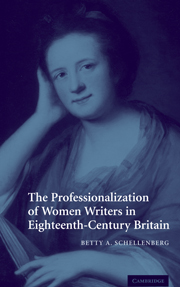Book contents
- Frontmatter
- Contents
- Acknowledgments
- A note on citations
- Introduction: “building on public approbation”
- 1 Frances Sheridan, John Home, and public virtue
- 2 The politicized pastoral of Frances Brooke
- 3 Sarah Scott, historian, in the republic of letters
- 4 The (female) literary careers of Sarah Fielding and Charlotte Lennox
- 5 Harmless mediocrity: Edward Kimber and the Minifie sisters
- 6 From propensity to profession in the early career of Frances Burney
- 7 Women writers and “the Great Forgetting”
- Coda
- Notes
- Bibliography
- Index
5 - Harmless mediocrity: Edward Kimber and the Minifie sisters
Published online by Cambridge University Press: 12 November 2009
- Frontmatter
- Contents
- Acknowledgments
- A note on citations
- Introduction: “building on public approbation”
- 1 Frances Sheridan, John Home, and public virtue
- 2 The politicized pastoral of Frances Brooke
- 3 Sarah Scott, historian, in the republic of letters
- 4 The (female) literary careers of Sarah Fielding and Charlotte Lennox
- 5 Harmless mediocrity: Edward Kimber and the Minifie sisters
- 6 From propensity to profession in the early career of Frances Burney
- 7 Women writers and “the Great Forgetting”
- Coda
- Notes
- Bibliography
- Index
Summary
I brought with me Hurd's Dialogues on Education, which have entertained his Grace very well, and a silly harmless story book called Maria, which serves to entertain myself at minutes when I am fit for nothing else.
(Catherine Talbot to Elizabeth Carter, 1764)Sophronia: Pray what is your opinion of Miss Minifie's Novels?
Euphrasia: They are in the class of mediocrity, if I were to mention such, it would make our task too long and tedious, I must therefore pass over these, and hundreds beside that are very innocent and moral books.
(Clara Reeve, The Progress of Romance, 1785)While insisting upon the need to reexamine mid-eighteenth-century women writers, this study has to this point taken for granted the importance of the publications and professional lives of Frances Sheridan, Frances Brooke, Sarah Scott, Sarah Fielding, and Charlotte Lennox. Perhaps the implication has even been that they merit this attention simply because their work has not been attended to sufficiently in the past. In a recent plenary presentation, Susan Staves argued that feminist literary critics have been reluctant to make value judgments about the work they are “recovering” or “rereading” or “restoring” for fear of a return to the exclusive universalizations of canon-making. Without by any means claiming to resolve the problems raised by a return to the discourse of aesthetic value, I want to take some steps in this chapter toward acknowledging the issue and determining how early “situated” critical commentary can be used as a guideline for reinstating women writers in a literary history that takes into account what might tentatively be isolated as transhistorical, but generically specific, criteria of aesthetic value.
- Type
- Chapter
- Information
- Publisher: Cambridge University PressPrint publication year: 2005



